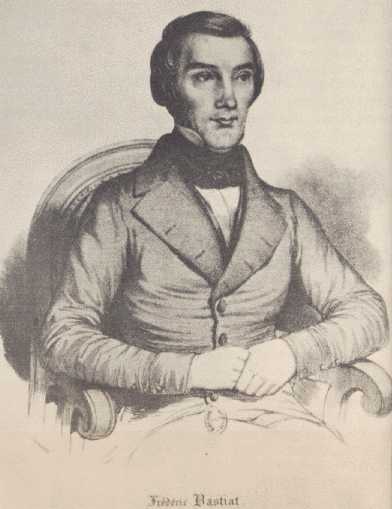Liberty Matters
A Memo from Bastiat to Cass Sunstein
 Adding to David Hart's list demonstrating Bastiat's impressive range and depth, here's one of my favorite passages in all of Bastiat's work. It's a passage, you will note, that serves remarkably well as a response to today's behavioral economists - nearly all of whom believe that humans' behavioral quirks disappear (or are much diminished) whenever humans exercise political power over each other.
Adding to David Hart's list demonstrating Bastiat's impressive range and depth, here's one of my favorite passages in all of Bastiat's work. It's a passage, you will note, that serves remarkably well as a response to today's behavioral economists - nearly all of whom believe that humans' behavioral quirks disappear (or are much diminished) whenever humans exercise political power over each other.Each party to an exchange consults, at his own risk and peril, his wants, his needs, his tastes, his desires, his means, his attitudes, his convenience - all the elements of his situation; and nowhere have we denied that in the exercise of free will there is the possibility of error, the possibility of an unreasonable or a foolish choice. The fault is imputable, not to the principle of exchange, but to the imperfection of human nature; and the remedy is to be found only in responsibility itself (that is, in freedom), since it is the source of all experience. To introduce coercion into exchange, to destroy free will on the pretext that men may make mistakes, would not improve things, unless it can be proved that the agent empowered to apply the coercion is exempt from the imperfection of our nature, is not subject to passion or error, does not belong to humanity. Is it not evident, on the contrary, that this would be tantamount not only to putting responsibility in the wrong place, but, even worse, to destroying it, at least in so far as its most precious attribute is concerned, that is, as a rewarding, retributive, experimental, corrective, and, consequently, progressive force?[53]]
How timeless is this passage?!
Endnotes
[53] Frederic Bastiat, Economic Harmonies (Irvington, NY: Foundation for Economic Education, 1964 [1850]), Chapter: 17: Private and Public Services, pp. 446-447. </title/79/35554/669667>.
Copyright and Fair Use Statement
“Liberty Matters” is the copyright of Liberty Fund, Inc. This material is put on line to further the educational goals of Liberty Fund, Inc. These essays and responses may be quoted and otherwise used under “fair use” provisions for educational and academic purposes. To reprint these essays in course booklets requires the prior permission of Liberty Fund, Inc. Please contact oll@libertyfund.org if you have any questions.